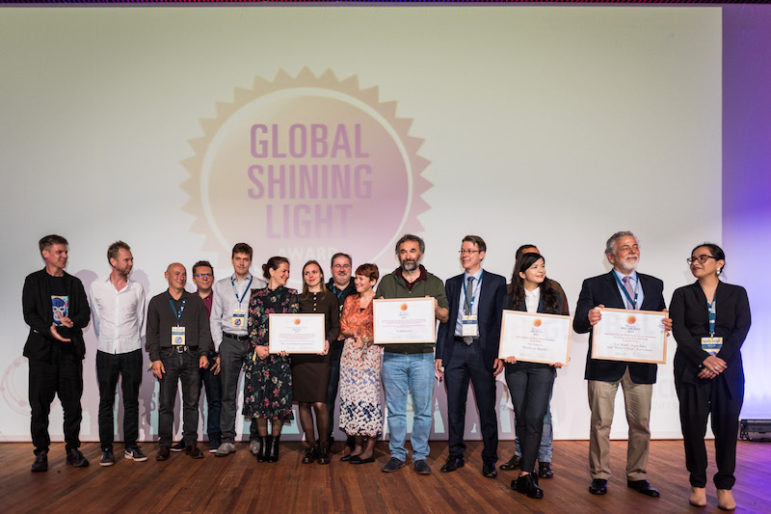
The winners of the Global Shining Light Awards. Photo copyright: Nick Jaussi
Stories on Latin American corruption, extrajudicial killings in the Philippines, and state capture in South Africa won the eighth Global Shining Light Awards, announced tonight at the Global Investigative Journalism Conference in Hamburg, Germany. The prize honors investigative journalism conducted in developing or transitioning countries, done under threat, duress, or in the direst of conditions.
The awards drew from a record 291 entries from around the world, featuring stories that were published or broadcast between January 1, 2017 and December 31, 2018.
The winners were chosen from a dozen extraordinary finalists. Given the large number and diversity of entries, GIJN for the first time split the awards into large outlets (with 10 or more staff) and small outlets (with less than 10 staff).
In the small outlets category, the judges awarded first place to “Car Wash”/“White Collars” (“Lava Jato”/“Lava Juez”), by Peru’s IDL-Reporteros. This series of investigations delved into the complex transnational corruption networked dubbed “Operation Car Wash” as well as corruption in Peru’s courts.
In the large outlets category, two investigations were awarded first place: “Murder in Manila,” by Rappler, on extrajudicial killings in the Phillipines’ drug war; and “#GuptaLeaks,” by multiple outlets (see details below), on how the Gupta family “captured” the South African state.
In addition, the judges honored two other projects with citations of excellence. In the small outlets category, this certificate went to “The Profiteers,” a documentary series by Kenya’s Africa Uncensored about how South Sudan’s elite plundered their nation. In the large outlets category, this certificate went to “The Azerbaijani Laundromat,” a cross-border investigation into a massive money-laundering operation, produced by the Organized Crime and Corruption Reporting Project in collaboration with numerous international outlets.
“The judges were impressed with the tenacity, courage, skill, and integrity demonstrated by this year’s winners of the Global Shining Light Award,” said Sheila Coronel, Academic Affairs Dean of the Columbia University Graduate School of Journalism, who was one of the judges. “They are living proof that investigative reporting can hold the powerful to account even in places where impunity and abuse of power reign. We salute these journalists — they are shining examples of what rigorous investigative reporting can achieve even in the most trying of times.”
In the Small Outlets Category:
Winner
“Car Wash” (“Lava Jato) and “White Collars” (“Lava Juez”), IDL-Reporteros (Peru+).
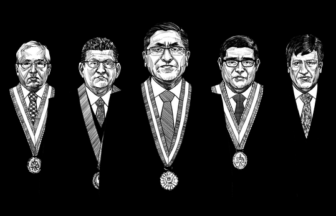 Team: For the “Car Wash” series: Gustavo Gorriti, Romina Mella, Hernán P. Floríndez, Rosa Laura, Margot Desautez. For “White Collars” series: Gustavo Gorriti, Romina Mella, Hernán P. Floríndez, Rosa Laura, Margot Desautez, Patricia Mayorga, Cruz Silva, Luis Miguel Purizaga.
Team: For the “Car Wash” series: Gustavo Gorriti, Romina Mella, Hernán P. Floríndez, Rosa Laura, Margot Desautez. For “White Collars” series: Gustavo Gorriti, Romina Mella, Hernán P. Floríndez, Rosa Laura, Margot Desautez, Patricia Mayorga, Cruz Silva, Luis Miguel Purizaga.
Peru’s IDL-Reporteros was one of the first media outlets to report on the bribes of Brazilian construction company Odebrecht and its complex corruption network — dubbed by prosecutors as “Operation Lava Jato” (Operation Car Wash in Portuguese) — that reached many other countries in Latin America, implicating presidents and other top government officials and politicians. As IDL-Reporteros doggedly continued reporting the case, their journalists uncovered another major story: corruption at the highest levels of Peru’s courts. Their “White Collars” series has prompted the state to make structural reforms to the justice system.
Citation of Excellence
“The Profiteers,” Africa Uncensored (South Sudan).
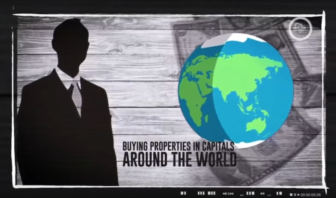
Screenshot from the documentary “The Profiteers.”
Team: John-Allan Namu, Elijah Kanyi, Samuel Munia.
This three-part documentary shines a light on how certain members of South Sudan’s elite have profited from the civil war and plundered their nation, all the while investing in Kenya and other East African countries. The investigation shows how these individuals move funds and obtain weapons with support from government and military officials, business people, and financial institutions in neighboring countries.
In the Large Outlets Category:
Winner (joint)
“Murder in Manila,” Rappler (Philippines).
 Team: Patricia Evangelista, Carlo Gabuco, Lian Buan, Rambo Talabong, Chay Hofileña.
Team: Patricia Evangelista, Carlo Gabuco, Lian Buan, Rambo Talabong, Chay Hofileña.
This series tells the story of President Rodrigo Duterte’s so-called war against drugs, which has claimed the lives of tens of thousands of people since he took office in 2016. Rappler’s six-month investigation showed strong indications that the police were outsourcing extrajudicial killings to a vigilante gang.
Winner (joint)
“#GuptaLeaks,” Daily Maverick (Scorpio investigative unit), amaBhungane Centre for Investigative Journalism, News24, OpenUp, and Finance Uncovered (South Africa).
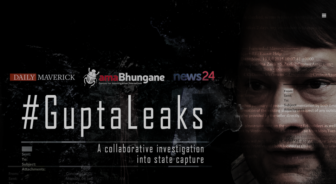 Team: Adi Eyal, Adriaan Basson, Angelique Serrao, Antoinette Muller, Branislav “Branko” Brkic, Craig McKune, Lester Freamon (pen name), Lionel Faull, Marianne Thamm, Micah Reddy, Pauli van Wyk, Pieter-Louis Myburgh, Rebecca Davis, Richard Poplak, Sally Evans, Stefaans Brümmer, Stephen “Sam” Sole, Susan Comrie, Tabelo Timse.
Team: Adi Eyal, Adriaan Basson, Angelique Serrao, Antoinette Muller, Branislav “Branko” Brkic, Craig McKune, Lester Freamon (pen name), Lionel Faull, Marianne Thamm, Micah Reddy, Pauli van Wyk, Pieter-Louis Myburgh, Rebecca Davis, Richard Poplak, Sally Evans, Stefaans Brümmer, Stephen “Sam” Sole, Susan Comrie, Tabelo Timse.
This collaborative investigation was based on a massive cache of emails from inside the business empire of the Gupta family, three brothers who moved to South Africa from India in the 1990s. Close to former President Jacob Zuma — who stepped down not long after the leaks were published — the series showed how the family “captured” the South African state, siphoning public cash to their companies in the process.
Citation of Excellence
“The Azerbaijani Laundromat,” Organized Crime and Corruption Reporting Project (OCCRP) in collaboration with numerous international outlets (Azerbaijan).
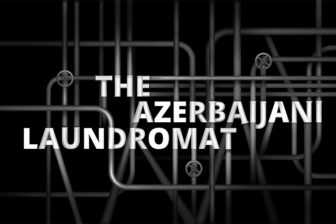 Team: Ilgar Agha, Roman Anin, Anna Babinec, Sophie Balay, Attila Biro, Jan Bratanic, Anuška Delić, Ricardo Ginés, Pavla Holcová, Khadija Ismayilova, Elena Loginova, Miranda Patrucić, Madina Mammadova, Paul Radu, Atanas Tchobanov, Jonny Wrate, Carole Kerbage, Dragana Peco, Nadia Shiyyab, Friedrich Lindenberg, Amy Guy, Lion Summerbell, Ilya Lozovsky, Jody McPhillips, Drew Sullivan, Birgit Brauer, Lejla Čamdžić, Roxana Jipa, Ana Poenariu, undisclosed Azerbaijani journalists.
Team: Ilgar Agha, Roman Anin, Anna Babinec, Sophie Balay, Attila Biro, Jan Bratanic, Anuška Delić, Ricardo Ginés, Pavla Holcová, Khadija Ismayilova, Elena Loginova, Miranda Patrucić, Madina Mammadova, Paul Radu, Atanas Tchobanov, Jonny Wrate, Carole Kerbage, Dragana Peco, Nadia Shiyyab, Friedrich Lindenberg, Amy Guy, Lion Summerbell, Ilya Lozovsky, Jody McPhillips, Drew Sullivan, Birgit Brauer, Lejla Čamdžić, Roxana Jipa, Ana Poenariu, undisclosed Azerbaijani journalists.
This collaborative, cross-border investigation uncovered how ruling elites in Azerbaijan benefited from a complex money-laundering operation and slush fund. Banking records revealed that some $2.9 billion passed through four shell companies registered in the United Kingdom over a two-year period.
The Global Shining Light Award is sponsored by the Global Investigative Journalism Network, an association of 182 nonprofit groups in 77 countries that work to support and spread investigative reporting. Founded in 2003, GIJN helps organize regional and international conferences and workshops, assists in the formation and sustainability of organizations dedicated to investigative and data journalism, and provides resources and networking services for investigative journalists worldwide.
